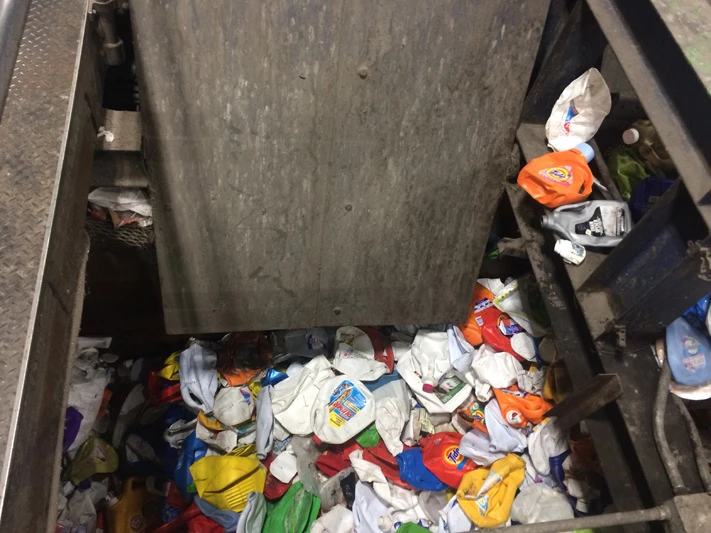
Recycling Today archives
Plastic scrap prices continued their descent in July as supply outpaced demand for polyethylene terephthalate (PET), high-density polyethylene (HDPE) and polypropylene (PP) recovered at material recovery facilities (MRFs) in the U.S.
A reprocessor based in the Southeast says natural HDPE bales have been selling in the low 30-cents-per-pound range as of mid-July, which represents a decline of 50 cents per pound over a five-week period. Mixed-color HDPE bales were selling for 8 cents per pound, down from nearly 20 cents per pound just a few weeks ago.
“Right now, all the markets are weak,” he says, adding that he suspects a general economic slowdown is to blame. “We’re seeing it across all industries.”
Demand is particularly soft from the pipe, flowerpot and automotive sectors, the reprocessor says, noting that automakers took downtime around the Fourth of July holiday, which hadn’t been the case in recent years as the industry tried to catch up from production delays related to pandemic-induced supply chain issues.
“When supply starts to shrink, then prices will rise. That’s the natural law.” -- a PET reprocessor based in the Northeast
The manufacturing sector is in recession, he says, citing a recent trade association meeting where those in attendance spoke of reduced demand for recycled commodities of all types.
The Southeast-based reprocessor says HDPE bale prices likely have found the bottom, but he thinks PP bale prices, which were at 7 cents per pound in mid-July, will continue to fall.
He says demand for his company’s recycled material is off by 7 percent to 8 percent as of mid-July, though the reduction is providing a welcome break as the company hasn’t been able to take downtime for service given the strong demand it has been seeing until recently. “We’re taking the opportunity to bring things down and do much-needed maintenance,” he says, adding that three months of slowness would be fine but going beyond that “starts becoming painful.”
A MRF operator based in the Midwest also notes slowness in the market. “Pricing is trending down right this moment with the processing capacity downtime taken at some places due to additional capital being invested in the industry,” he says. “Supply is up, causing some pricing to come down.”
Despite the situation as of midsummer, the MRF operator is hopeful. “I think plastics will remain in high demand as we continue to see the pull through from brands trying to meet their sustainability goals,” he says.
A PET reprocessor based in the Midwest also says she believes trends support growing recycled-content demand going forward as consumer packaged goods companies realize if they are going to package their products in plastics, they need to be using recycled content. “I don’t think there’s any going back,” she adds.
She’d like to see the future bring more stability. “We would love to see a steady, stable market instead of the wild swings,” the PET reprocessor says.
However, low virgin PET pricing is affecting what consumers are willing to pay for recycled PET (rPET), she says, adding, “When you have your primary product price depressed, absolutely your secondary product is going to be price depressed. It’s hard to make the market work when pricing is this low.”
The Midwest-based PET reprocessor says the last year and a half has been a roller coaster ride. “Brands were really trying to move up their recycled content plans, and then the market got totally out of whack, and bales went to prices they never went to before,” she says. “Plans were really slowed down.” She adds that brands remain committed to using recycled content but the pace at which they are increasing rPET content has slowed given the volatility.
A PET reprocessor based in the Northeast also notes the “crazy swings of the last couple of years due to the pandemic—the biggest excuse-maker ever to exist.”
Regarding the current low pricing, he’s uncertain how long that will last, though he says he imagines pricing will begin increasing by the end of the first quarter of next year.
“When supply starts to shrink, then prices will rise,” he says. “That’s the natural law.”
He says the housing market being in the doldrums is affecting sales of carpet and other fiber-based goods that consume recycled polyester, though the bottle-to-bottle market appears to be holding up.
Latest from Recycling Today
- ReMA urges open intra-North American scrap trade
- Axium awarded by regional organization
- China to introduce steel export quotas
- Thyssenkrupp idles capacity in Europe
- Phoenix Technologies closes Ohio rPET facility
- EPA selects 2 governments in Pennsylvania to receive recycling, waste grants
- NWRA Florida Chapter announces 2025 Legislative Champion Awards
- Goldman Sachs Research: Copper prices to decline in 2026





